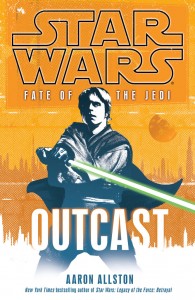 There’s a new Star Wars series again, set 40 years after the events of the movies, decades past the final fall of the Empire, well past the invasion of an extra-galactic alien armada not affected by the Force, just a few years past a second galactic civil war caused by another Sith lord from the Skywalker line. And this most recent event shows that people are basically the same all over; public sentiment has turned sharply against the Jedi Order in the wake of Jacen Solo’s fall, mostly because political figures are of the opinion that Luke Skywalker should have seen it coming and prevented it.
There’s a new Star Wars series again, set 40 years after the events of the movies, decades past the final fall of the Empire, well past the invasion of an extra-galactic alien armada not affected by the Force, just a few years past a second galactic civil war caused by another Sith lord from the Skywalker line. And this most recent event shows that people are basically the same all over; public sentiment has turned sharply against the Jedi Order in the wake of Jacen Solo’s fall, mostly because political figures are of the opinion that Luke Skywalker should have seen it coming and prevented it.
The truth of that statement, despite its simultaneous unfairness, points Luke and his son Ben on a quest through the galaxy in search of the various Force-sensitive but non-Jedi societies Jacen visited in the years before his fall, to see if they can find any clues. After establishing this premise and hinting at mental illnesses that may be starting to afflict some of the Jedi, Outcast proceeds to… well, to stall out. The first leg of Luke’s investigation is entertaining, as are Han and Leia’s adventures trying to keep a planet from being blown up. (By earthquakes, not Death Stars.) But the pacing back and forth between these stories and the Jedi illness plotline is awkward, and by the end of the book, I felt like it maybe should have been compressed into just a hundred pages with plenty of room for more. Worse, the Han and Leia plotline actually had no apparent bearing on anything else, even though I’m well aware that a seemingly minor event involving their granddaughter will be relevant later on. The knowing and the entertainment just weren’t quite enough to make up for the structural weirdness and the slowness of the pace.
Possibly as part of a straight through read of the nine book series, the pacing would not have struck me oddly, but in the book standing alone: no good. Luckily, I did enjoy the discrete events, so I have no worries about liking the next book, whenever I get around to reading it. (Probably not terribly long from now, as it would be nice to be caught up again.) I guess the majority of my disappointment comes from the fact that Aaron Allston is a known good quantity in the Star Wars Expanded Universe, and to see plotting or pacing problems from him, much less both, confuses me more than just any randomly off-kilter Star Wars book would. It’s not like they don’t exist in the wild.





